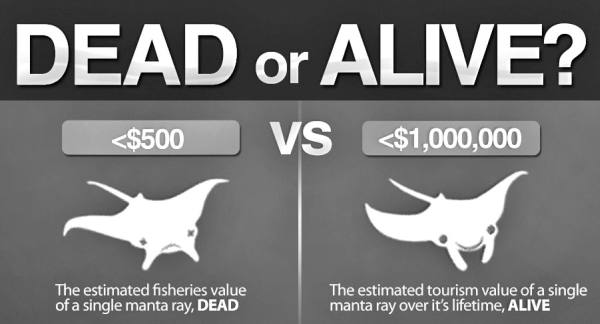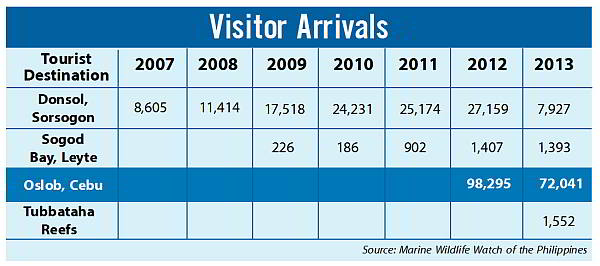Lucky Cebu has shark tourism all year round
Cebu is the only place in the Philippines where divers can see sharks all year round – thresher sharks in Malapascua island in the far north and whalesharks in the southern town of Oslob.
In other popular marine sites like Donsol and the Tubbataha reef, sharks and manta rays show up during specific months.
“Sharks are more valuable alive than dead,” said AA Yaptinchay director of the Marine Wildlife Watch of the Philippines during the first of a two-day national Shark Summit held at the Cebu Provincial Capitol.
Shark tourism earns revenue for local governments and the host community.

A comparison of the value of a manta ray that is killed versus one kept alive as a tourism attraction.
Since 1990, foreign divers have been coming to Malapascua in Daanbantayan town for its white sand beaches and to see thresher sharks, which appear almost daily in Monad Shoal.
Lugon (Malapascua) barangay captain Rex Novabos said their town earns an average income of P300,000 a year from diving fees.
Divers pay a P150 fee to Daanbantayan municipality of which P30 goes to the barangay as a fund for protection and conservation efforts.
In the first year of Oslob’s whaleshark tours, the southern town generated $1 million, said Yaptinchay.
In 2012, the town registered 98,000 tourists although it declined to 72,000 in 2013.
Oslob’s marine enterprise outpaces the 15-year-old program in Donsol, Sorsogon province, the original capital of whaleshark “interaction” tours, which generated $325,000.
Donsol visitor arrivals peaked at 27,000 in 2012.
A shark alive has a potential value of $2 million a year in a properly managed eco-tourism program, according to Mark Dia, Greenpeace Southeast Asia Regional oceans campaign manager.
But regulations need to be set up in tourism. Although there are laws and some local ordinances that protect certain marine species, these laws are not well enforced.
During break-out sessions in the summit, tourism stakeholders noted the lack of infrastructure support in tourist areas and the need to debunk stereotypes of sharks as being dangerous man-eaters, an image promoted in movies.
“The fear of sharks still needs to be addressed,” said one of the presentors of the tourism group.
Mar Guidote of Ecofish-USAID also said law enforcers have to be familiar with conservation laws and the species that need protection.
“A tourist police force is supposed to protect tourism sites and not only tourists. Any enforcement program must have prevention,” said Guidote, a coastal law enforcement specialist.
The summit aims to discuss strategies to improve the tourism sector, proper advocacy and information campaign, enforcement and come up with policies to protect sharks and manta rays.
In the Philippines, sharks are hunted for their fins, meat, and liver oil.
Margot Stiles of Oceana said shark hunting is a “symptom of illegal fishing”. Because prices of fish are higher, shark meat has a lower value than when it is alive.
“Fishermen no longer fish tuna anymore. They go for shark because that is the only way they can stay afloat. Tuna species are declining because of overfishing,” Dia said.
Meat when sold fresh will fetch a price of P20 – P60 per kilo in Luzon or P10 to P24 a kilo in the Visayas and Mindanao.
The buying rate at the landing site is usually lower. Dried meat commands a higher price of P 35 to P75 per kilo.
“Meat is usually consumed locally. In recent years, meat is processed into fish balls,” said Vince Cinches, oceans campaigner of Greenpeace.
Related Stories:
Fate of sharks take centerstage in summit
Provincial Board seeks ban on hunting hammerhead sharks, transport of ‘samu’ seagrass
Disclaimer: The comments uploaded on this site do not necessarily represent or reflect the views of management and owner of Cebudailynews. We reserve the right to exclude comments that we deem to be inconsistent with our editorial standards.


